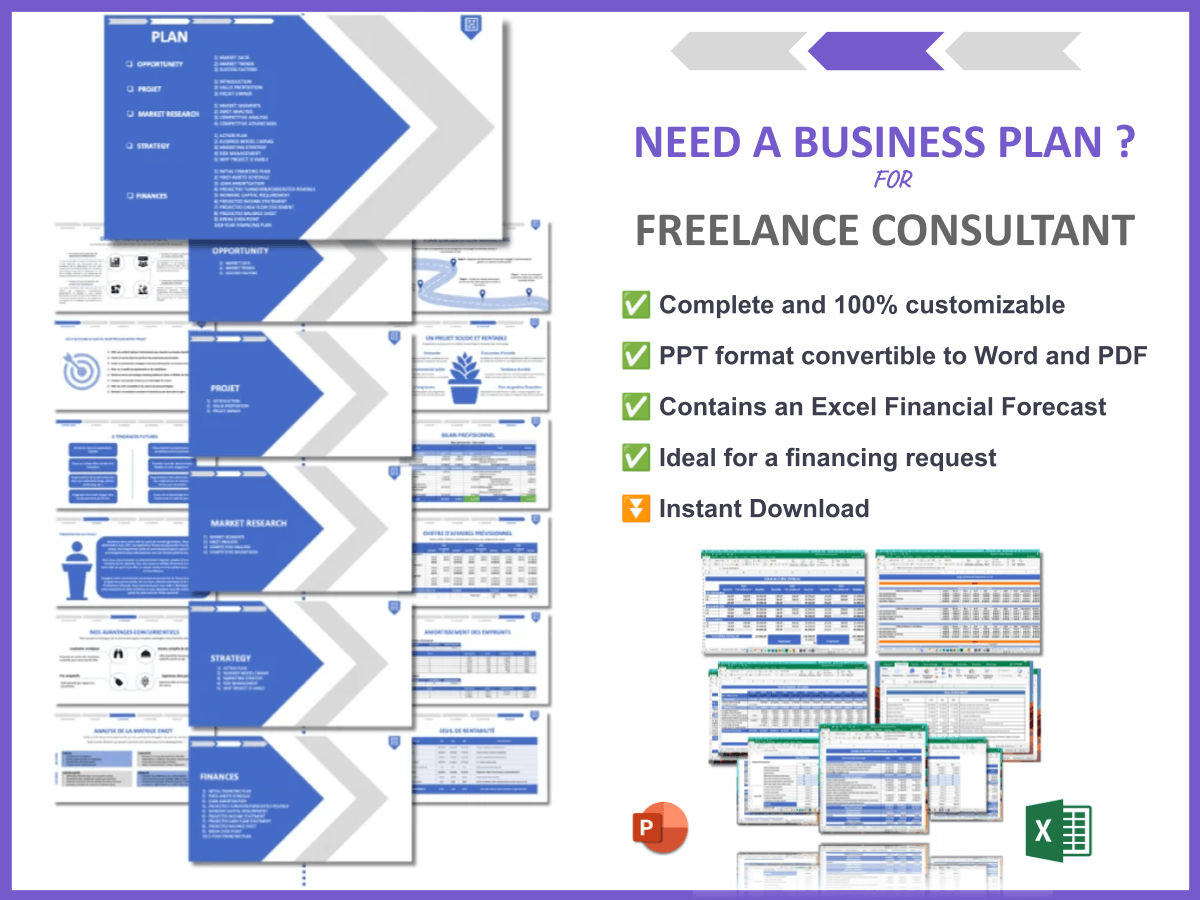Are you considering how to start a freelance consultant business? You’re not alone! In recent years, the freelance consulting industry has exploded, with more people seeking flexibility, autonomy, and the ability to monetize their expertise. In fact, studies show that over 35% of the U.S. workforce is now freelancing, and this number is only expected to grow. So, what exactly does it mean to be a freelance consultant? Essentially, it involves providing expert advice to businesses or individuals in your area of expertise, all while working independently. It’s an exciting journey that can offer both financial rewards and personal fulfillment.
In this article, we’ll explore essential steps to help you get started on your freelance consulting journey:
- Identify your niche and expertise.
- Create a solid business plan.
- Conduct thorough market research.
- Choose a memorable business name.
- Decide on your legal structure.
- Secure funding and manage finances.
1. Identify Your Niche and Expertise as a Freelance Consultant
Understanding your unique skills is vital for success as a freelance consultant. This is the foundation of your business. Think about what you’re passionate about and where your strengths lie. Ask yourself:
- What specific skills do I possess?
- What industries do I have experience in?
- What problems can I solve for my clients?
Once you have a clear understanding of your strengths, it’s time to narrow down your niche. This will not only help you target your marketing efforts but also establish yourself as an expert in that area. Consider these steps:
- Conduct a self-assessment to identify your skills.
- Research potential niches to see where demand exists.
- Evaluate the competition to find gaps you can fill.
By focusing on a specific niche, you can create tailored services that resonate with your target audience, increasing your chances of success.
2. How to Start a Freelance Consultant Business Plan?
Creating a solid business plan is crucial. It acts as your roadmap and helps you stay focused on your goals. A well-thought-out business plan should include:
- Your business concept and goals.
- Market analysis and competition overview.
- Marketing and sales strategies.
- Financial projections and budget.
It may seem daunting, but having a structured plan will guide you through the early stages of your business. I recommend checking out this business plan template for Freelance Consultant. It’s super detailed and can save you a ton of time!
As you create your business plan, keep in mind the following tips:
- Be realistic about your goals and timelines.
- Include measurable milestones to track your progress.
- Be prepared to adapt your plan as needed.
Remember, a business plan is not just a document; it’s a living guide that should evolve with your business. This will help you stay organized and proactive in your journey to becoming a successful freelance consultant.
3. Conduct Market Research and Analyze Your Competition
Understanding the landscape of your chosen niche is essential. Conducting thorough market research helps you identify opportunities and challenges you may face as a freelance consultant. Here’s how you can approach this:
- Identify your target audience: Who are your ideal clients? What industries do they belong to?
- Analyze current trends: What are the latest developments in your niche? How can you leverage them?
- Examine your competitors: What services are they offering? What pricing strategies do they use?
When it comes to analyzing your competitors, it’s important to know their strengths and weaknesses. Here’s a simple table to help you organize your findings:
| Competitor | Strengths | Weaknesses |
|---|---|---|
| Competitor A | Strong brand recognition | Higher pricing than average |
| Competitor B | Wide range of services | Lack of personalized service |
| Competitor C | Excellent customer feedback | Limited marketing presence |
By understanding your competitors, you can differentiate your services and find ways to attract clients who may be underserved. This knowledge will empower you to position yourself effectively in the market.
4. Choose a Memorable Name for Your Freelance Consulting Business
Your business name is your first impression, and it should resonate with your target audience. A memorable name can set you apart and make it easier for potential clients to find you. Here are some tips for choosing the right name:
- Reflect your expertise: Ensure your name conveys the services you offer.
- Keep it simple: Choose a name that is easy to spell and pronounce.
- Check for availability: Ensure the name isn’t already in use, and check domain availability for your website.
To brainstorm ideas, consider using these techniques:
- Combine words that describe your services.
- Use your name or initials to personalize your brand.
- Get feedback from friends or colleagues.
Once you have a few options, try saying them out loud. Do they feel right? Are they easy to remember? Your business name is an essential part of your brand identity, so take the time to choose wisely!
5. Decide on the Legal Structure for Your Freelance Consultant Business
Choosing the right legal structure for your freelance consulting business is a critical step that can impact your taxes, liability, and overall operation. Here are some common structures to consider:
- Sole Proprietorship: This is the simplest structure, where you and your business are considered one entity. It’s easy to set up, but you are personally liable for any debts or legal issues.
- Limited Liability Company (LLC): An LLC provides personal liability protection while allowing you to enjoy the tax benefits of a sole proprietorship. It requires more paperwork but is a popular choice for many consultants.
- Corporation: This is a more complex structure that offers liability protection and potential tax benefits. However, it involves more regulations and paperwork.
To help you make an informed decision, here’s a table summarizing the pros and cons of each structure:
| Structure | Pros | Cons |
|---|---|---|
| Sole Proprietorship | Easy to set up and manage | Unlimited personal liability |
| LLC | Limited liability protection | More paperwork and fees |
| Corporation | Strong liability protection | Complexity and higher costs |
When deciding on the legal structure, consider your business goals, the level of risk involved, and your willingness to handle administrative tasks. Consulting with a legal professional can also provide valuable insights tailored to your specific situation.
6. Secure Funding and Financial Resources for Your Freelance Consultant Business
Funding is essential for launching your freelance consultant business. You’ll need to assess your startup costs and determine how you plan to finance your venture. Here are some key steps to secure funding:
- Estimate Your Startup Costs: Consider expenses like website development, marketing, office supplies, and any software you might need. Make a detailed list to get an accurate picture of what you’ll need.
- Explore Funding Options: Common sources include personal savings, loans from banks or credit unions, and even crowdfunding platforms. Each option has its pros and cons, so evaluate what works best for you.
- Create a Budget: Once you have a clear understanding of your costs and funding sources, develop a budget to manage your expenses and keep track of your financial health.
In addition to these steps, consider establishing a separate business bank account to keep your personal and business finances separate. This will make it easier to track expenses, prepare for taxes, and manage cash flow. Remember, having a solid financial foundation is key to long-term success as a freelance consultant.
7. Register Your Freelance Consultant Business Officially
To operate legally, you need to register your freelance consulting business. This step varies by location and can involve several processes. Here’s how to go about it:
- Check Local Regulations: Visit your local government website to understand the requirements for registering a business in your area. This may include specific forms and documentation.
- Choose a Business Name: If you haven’t already, finalize the name for your business. Ensure it complies with local naming regulations and isn’t already in use.
- Fill Out Necessary Paperwork: Depending on your chosen legal structure, you’ll need to complete various forms. This could include applying for a business license, a fictitious business name (DBA), or registering an LLC.
Once you’ve registered your business, make sure to keep all documentation organized. This will be helpful for future reference, especially during tax season. Being compliant with local regulations not only legitimizes your business but also builds trust with potential clients.
8. Obtain Necessary Tax Identification Numbers, Licenses, and Permits
Complying with legal requirements is crucial for your freelance consultant business. You may need to obtain several tax identification numbers, licenses, and permits to operate legally. Here’s what to consider:
- Tax Identification Number (TIN): Most businesses require a TIN for tax purposes. If you’re a sole proprietor, you might use your Social Security Number (SSN), but getting an Employer Identification Number (EIN) is often recommended.
- Business Licenses: Depending on your location and the services you provide, you may need specific licenses. Check with local and state authorities to see what applies to your business.
- Permits: Certain industries may require additional permits, especially if you’re providing specialized services. Make sure to research and comply with all necessary regulations.
Staying organized with your legal documents will help you avoid any fines or issues down the road. Additionally, consider consulting with a legal professional to ensure you meet all requirements specific to your niche. Taking these steps will not only keep you compliant but also enhance your credibility as a freelance consultant.
9. Set Up Financial Management Systems for Your Freelance Consultant Business
Proper financial management is essential for the success of your freelance consulting business. A well-organized financial system will help you track your income, manage expenses, and prepare for tax season. Here’s how to set up an effective financial management system:
- Choose an Accounting Method: You can opt for either cash or accrual accounting. Cash accounting records income and expenses when they occur, while accrual accounting records them when they’re earned or incurred. Most freelancers prefer cash accounting for its simplicity.
- Use Accounting Software: Consider using accounting software like QuickBooks, FreshBooks, or Wave. These tools can help you automate invoicing, track expenses, and generate financial reports.
- Track Expenses and Income Meticulously: Keep all receipts and invoices organized. Categorize your expenses into different areas, such as marketing, office supplies, and professional development, to make tracking easier.
To better understand your financial health, it’s useful to create a simple financial dashboard. Here’s an example of how you might set it up:
| Financial Metric | Current Amount | Target Amount |
|---|---|---|
| Monthly Income | $3,000 | $5,000 |
| Monthly Expenses | $1,200 | $1,000 |
| Net Profit | $1,800 | $4,000 |
This type of financial overview will help you identify areas where you can improve and ensure that you’re on track to meet your financial goals. Remember, being proactive about your finances can save you a lot of stress later on.
10. Establish Your Brand Identity as a Freelance Consultant
Your brand identity is how clients perceive you and your business. It’s crucial to establish a strong brand that reflects your values and expertise as a freelance consultant. Here’s how to create a compelling brand identity:
- Design a Professional Logo: A well-designed logo can convey professionalism and make your business memorable. Consider hiring a graphic designer or using online tools like Canva to create one.
- Develop a Consistent Color Scheme: Choose colors that resonate with your target audience and reflect your brand’s personality. Consistency across all your marketing materials will strengthen your brand recognition.
- Craft a Compelling Brand Story: Share your journey, values, and what sets you apart from other consultants. A relatable brand story can help you connect with potential clients on a personal level.
Additionally, think about how you want to communicate with your audience. This includes your tone of voice, messaging, and overall presence on social media and your website. The more authentic and consistent your brand identity is, the more likely you are to attract the right clients.
11. Develop a Professional Website for Your Freelance Consulting Business
In today’s digital age, having a professional website is crucial for your freelance consulting business. Your website serves as your online portfolio, showcasing your expertise and services. Here’s how to create an effective website:
- Choose a User-Friendly Platform: Consider platforms like WordPress, Wix, or Squarespace. These options offer templates that make it easy to create a professional-looking site without extensive coding knowledge.
- Include a Portfolio of Your Work: Showcase your previous projects, case studies, or testimonials from clients. This will build credibility and demonstrate your capabilities.
- Optimize Your Website for SEO: Use relevant keywords throughout your site to improve your search engine ranking. This includes optimizing your page titles, meta descriptions, and content.
Here’s a basic structure you might consider for your website:
| Page | Content |
|---|---|
| Home | Overview of services and value proposition |
| About | Your background, mission, and brand story |
| Services | Detailed descriptions of your consulting services |
| Portfolio | Examples of past work and success stories |
| Contact | Contact form and social media links |
Remember, your website is often the first impression potential clients will have of you. Make sure it reflects your professionalism and expertise!
12. How to Start a Freelance Consultant: Market and Advertise Your Services
Once your business is set up, it’s time to market and advertise your services. This is crucial for attracting clients to your freelance consulting business. Here are some strategies to consider:
- Utilize Social Media Platforms: Platforms like LinkedIn, Facebook, and Instagram can be powerful tools for connecting with potential clients. Share valuable content, engage with your audience, and showcase your expertise.
- Network in Your Community: Attend local business events, workshops, and conferences. Building relationships with other professionals can lead to referrals and new clients.
- Consider Content Marketing: Create blog posts, videos, or webinars that provide value to your target audience. This not only establishes you as an expert but also drives traffic to your website.
In addition to these strategies, don’t underestimate the power of word-of-mouth referrals. Satisfied clients can be your best advocates, so always strive to deliver exceptional service. As you implement these marketing strategies, keep track of what works best for your business and adjust your approach accordingly.
13. Assemble Your Team or Network for Support
Even as a freelance consultant, you don’t have to go it alone. Building a network of support can enhance your business and provide valuable resources. Here’s how to assemble your team:
- Join Freelance Communities: Look for online forums, social media groups, or local meetups where freelancers gather. These communities can offer advice, share experiences, and provide encouragement.
- Attend Networking Events: Participate in industry conferences, workshops, and local business gatherings. These events are great opportunities to meet potential collaborators and clients.
- Consider Collaboration Opportunities: Partnering with other freelancers can expand your service offerings. For example, if you’re a marketing consultant, collaborating with a graphic designer could enhance your project deliverables.
Having a supportive network can provide motivation, guidance, and new opportunities for growth. Remember, even as a freelancer, building relationships is key to your long-term success. By following these steps, you’ll be well on your way to establishing a thriving freelance consulting business!
Conclusion
Starting your own freelance consulting business can be an exciting and rewarding venture. By following the steps outlined in this guide, from identifying your niche to establishing your brand, you can set yourself up for success. Remember, persistence and adaptability are key components of this journey.
As you continue to grow your business, consider diving deeper into specialized topics. For instance, you can learn how to create a SWOT Analysis for Freelance Consultant to evaluate your strengths and weaknesses effectively. Additionally, check out our article on How to Launch a Freelance Consultant Marketing Plan? With Example to help you develop a comprehensive strategy for attracting clients.
With dedication and the right strategies, you can build a thriving freelance consulting business that aligns with your passions and expertise!
FAQ
- What is a freelance consultant?
A freelance consultant is an independent professional who provides expert advice to businesses or individuals in a specific field, often on a project basis. - How do I find clients as a freelance consultant?
Clients can be found through networking, social media marketing, content marketing, and referrals from satisfied customers. Building a strong online presence can also attract potential clients. - What skills do I need to be a successful freelance consultant?
Essential skills include expertise in your field, strong communication, problem-solving abilities, and time management. Additionally, marketing and business management skills can be beneficial. - How much should I charge as a freelance consultant?
Consultant rates vary widely based on factors such as experience, niche, and location. Researching industry standards and competitor pricing can help you set a competitive rate. - Do I need a business license to be a freelance consultant?
Yes, depending on your location and the nature of your consulting services, you may need to obtain a business license or permits. It’s essential to check local regulations. - How can I market my freelance consulting services?
Effective marketing strategies include utilizing social media, creating valuable content, networking, and attending industry events. Building a professional website also enhances your visibility. - What are the common challenges faced by freelance consultants?
Common challenges include client acquisition, managing finances, maintaining work-life balance, and dealing with inconsistent income. Developing a solid business plan can help mitigate these issues. - How do I manage my finances as a freelance consultant?
Using accounting software, tracking expenses, and separating personal and business finances are key to managing your finances effectively. Consider hiring a bookkeeper if needed. - What legal structure should I choose for my freelance consulting business?
The legal structure depends on your needs. Common options include sole proprietorship, LLC, or corporation. Each has its pros and cons, so choose based on liability and tax considerations. - How can I improve my consulting skills?
Improving your skills can be achieved through continuous learning, attending workshops, seeking feedback from clients, and networking with other professionals in your field.






